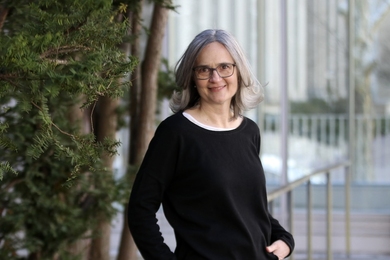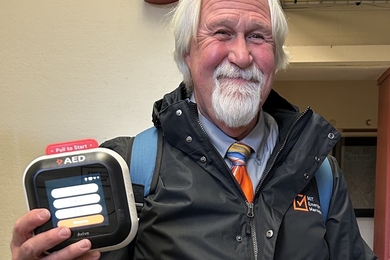The Massachusetts Institute of Technology will provide educational programming, training and a monthly video magazine show about what MIT can do for businesses in a new alliance with Public Broadcasting System's The Business Channel.
The MIT development was part of the announcement of a new joint venture of PBS with the Williams Company, which is investing $20 million to strengthen The Business Channel, currently a PBS satellite TV subscription service serving 6,000 companies and organizations.
The aim of The Business Channel, L.L.C., co-owned by PBS and Williams, will be to change dramatically the way businesses educate and train their employees. By July 1, 1997, interactive, multi-media education will be delivered on-demand to an employee's computer desktop or a company's training center, PBS and Williams said in announcing the joint venture Sept. 12 at a New York press conference.
"Last year, American businesses spent $52.2 billion educating and training 49.6 million employees," said Robert T. Jones of the National Alliance of Business. "In the next few years, these numbers will go through the roof. In the near future, you can expect every single worker to need continuous training and skills upgrading."
MIT President Charles Vest, commenting on the strategic relationship involving the MIT Center for Advanced Educational Services (CAES), said, "We are delighted to launch this new and important relationship with PBS, known and respected internationally for its fine educational programming. Today's work force faces unprecedented challenges in keeping current in the latest developments in science and technology that may affect business. An education that stops at age 22 or even age 26 is an obsolete education. In our modern world, continually changing due to technological progress, professionals must continue their education throughout their careers. And, we cannot expect continuing education to be provided only within the ivied walls of brick and mortar universities, Dr. Vest said.
"We must now use the computer and telecommunication technologies, invented in part at our research universities, to deliver excellent learning experiences at the professional's place of work. This we intend to do as we build our relationship with The Business Channel over the coming months and years."
President Vest continued, "I am especially pleased that the new relationship with MIT will also include the creation of a pilot MIT 'Video Magazine,' with the possibility of it becoming a regular monthly feature of The Business Channel.
"This video magazine, to be produced for The Business Channel by the MIT center, will focus on continuing research and development at MIT that may affect business in fundamental ways one to five years down the road. This will provide an invaluable and unique 'early alert system' to business. And it will benefit MIT, an institution that has spawned over 600 start-up companies, by demonstrating the importance of university-based research to the business community."
Dr. Vest added, "This new relationship with The Business Channel builds on MIT's recent initiatives in distance learning, including the Systems Design and Management (SDM) Program, MIT's first Master's degree program for off-campus learners, and on the CAES Advanced Study Program, which has registered learners from participating companies as far away as Buenos Aires, Argentina. We are hoping that this new relationship will be synergistic with these MIT programs."
Professor Richard C. Larson, director of CAES, said, "This new relationship with PBS and Williams provides a tremendous opportunity for MIT faculty to teach people currently working in industry. "
The technology at the center of The Business Channel, L.L.C. has two elements: the global television transmission network of Vyvx, Inc., a Williams subsidiary and the world's largest provider of fiber-optic and satellite video distribution, and Vyvx's on-demand archiver server system. The new venture will also integrate PBS's existing satellite service and the interactive capabilities of PBS On-line, a leading source of quality educational content developed specifically by PBS for the Internet.
Scott McNealy, chairman and CEO of Sun Microsystems, said the pace of technology today requires frequent and intensive retraining. "About 20 percent of the work needs to be retrained each year," he estimated, noting that this meant complete retraining of the work force over a five-year cycle. Sun Microsystems, Inc. will provide its Sun MediaCenter servers to The Business Channel. "Sun believes in the future of distance learning, and we are pleased that Williams has chosen our MediaCenter servers as the technological backbone of its landmark venture with PBS," he said.
Keith E. Bailey, chairman, president and chief executive officer of Williams. "The Business Channel helps answer corporate America's need to provide easily accessible continuing education to employees at all levels, which will be essential if they are to stay at the top of their fields in our rapidly changing world."
Ervin S. Duggan, PBS president and chief executive officer, said, "For more than a quarter-century, Americans have turned to PBS for the finest in lifelong-learning opportunities. This partnership will use the best new technology to bring the best educational content to millions more American workers."
Established in 1989 as a satellite-based, business-education initiative of the PBS Adult Learning Service, The Business Channel currently serves 6,000 companies, nonprofit institutions, colleges and government agencies. With an infusion from Williams of approximately $20 million, the next-generation Business Channel will greatly expand its array of business-oriented programming, live seminars, video conferences, and other educational resources, including specialized, industry-targeted services. Products from Williams' training subsidiary, Williams Learning Network, Inc. (WLN), which has the nation's largest CD-ROM and computer-based library of training materials for the chemical, refining, utility and manufacturing industries, will also be made available to The Business Channel, L.L.C.
PBS's 346 member stations will be invited to serve as local marketers of The Business Channel to area businesses, colleges and other organizations. There will also be opportunities for PBS stations to produce programming and other materials for the service.
The 20-year agreement between PBS and Williams calls for the creation of a management committee to operate the new enterprise. PBS will have sole and exclusive editorial control of all Business Channel programming and will be responsible for the day-to-day management of programming and marketing activities. The WilTech Group, Inc., a Williams subsidiary, will provide transmission, archiver and software services. Each partner will receive a 50 percent share of the gross cash flow, with PBS using its share to support public television's varied non-commercial, educational mission.





